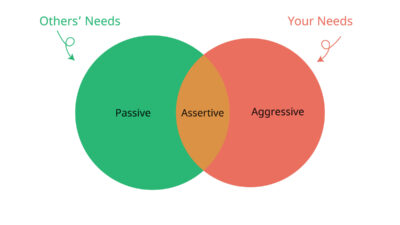Do you express and stand by your point of view when needed?
Do you communicate your needs clearly and with conviction?
Does fear or self-doubt hold you back?
Competitive Workplaces
In today’s workplaces, ideas communicated with clarity and confidence gain the spotlight. Unfortunately, equally good views lacking assertiveness tend to go unnoticed.
If this resonates with you, it’s time to explore the power of assertiveness, a vital behaviour and skill for leaders in the professional world.
Potential Roadblocks
First, let’s explore what may prevent you from being assertive.
Low self-confidence: You may struggle to assert yourself due to a lack of confidence in your abilities or the value of your ideas.
Fear of conflict or confrontation: Maybe you are conflict-averse and worry about creating friction by stating your viewpoints firmly.
A need to please others: This can lead to an inability to say ‘no’ or set healthy boundaries, which are integral to assertiveness.
A habit of judging self and others: By labelling yourself or others (as selfish, aggressive, demanding, or complex), you can trap yourself within these stereotypes.
A false notion of safety: You may believe that staying under the radar and not voicing your opinions is a safer strategy.
Watch Out
Holding yourself back or not asserting yourself where needed can then lead to any or all of the below challenges :
Lost opportunities to contribute meaningfully: When you don’t express your thoughts or ideas, you may miss out on opportunities to contribute to projects or initiatives that could benefit from your input.
An excessive workload due to the inability to say ‘no’: Not being assertive often translates to taking on more work than you can handle, leading to burnout and compromising the quality of your work.
Being overlooked for crucial projects or strategic assignments: By not voicing your interests and capabilities, you may be forgotten when leadership assigns important tasks, affecting your professional growth.
Experiencing frustration, stress, and resentment: When your voice is not heard, it can lead to feelings of frustration and resentment, which over time, can result in chronic stress, negatively affecting both your personal and professional life.
Adverse impact on mental health and overall well-being: Constant stress and frustration can affect mental health. In the long run, a lack of assertiveness can lead to lower self-esteem and overall well-being.
Speak up. You are worth it.
However, it does not have to be that way; like others, you can learn to speak up for yourself, assert and feel heard, acknowledged and honoured.
Below are seven steps you can explore in developing your assertiveness.
- Acknowledge your value: Recognize that your ideas and opinions are valuable. This affirmation can boost your self-confidence and help you feel more comfortable speaking up.
- Seek professional help: Executive coaches are experienced in helping professionals navigate workplace challenges. They can provide strategies and techniques to enhance your assertiveness.
- Clarity of intent: When communicating, you must be clear about your intentions. This clarity can help you articulate your thoughts more confidently and effectively.
- Practice makes perfect: Start by practising assertiveness in low-risk situations. You can gradually apply these skills in more challenging scenarios as you get comfortable.
- Leverage supportive colleagues: Collaborating with understanding colleagues can help create a supportive environment for you to practice assertiveness. Ask them to include you in discussions during meetings.
- Question assumptions and fears: Challenge the beliefs and fears that hold you back. Often, the fear of being assertive is worse than the reality of it.
- Study the outcomes: Pay attention to the reactions and results when you assert yourself. This can help you understand the impact of your assertiveness and adjust your approach if needed.
Benefits, benefits and more benefits
Following the seven steps can support you in enhancing your levels of assertiveness and also benefit you in the following ways:
- Inspiring and influencing others more effectively: When you assertively articulate your thoughts and ideas, you can inspire others and have a more influential role in your team or organization.
- Enhancing your professional reputation and credibility: Being assertive can demonstrate your leadership abilities and build your reputation as a confident and capable professional.
- Communicating with more impact: Assertive communication ensures your message is clear and direct, increasing the likelihood that your message will be understood and received positively.
- Establishing clear boundaries: Being assertive allows you to set clear boundaries, preventing overwork and fostering healthier professional relationships.
- Honouring your personal and professional values: You ensure your actions align with your values by standing up for your beliefs.
- Role modelling courage for your teams: Your assertiveness can inspire team members to speak up and express their thoughts, fostering a more open and communicative environment.
- Strengthening self-belief: Each time you successfully assert yourself, you reinforce your self-confidence and belief in your abilities.
- Reducing stress and improving your well-being: By expressing your thoughts and setting boundaries, you reduce the stress of unspoken issues and improve your overall well-being.
In Closing
By being assertive, you avoid drama and friction and express your
needs clearly and makes it easy for others to meet them.
May you get to express yourself in every way
May your expressions positively impact others every day.
Points to Ponder:
- When and where am I assertive enough in my work and life?
- What learnings can I apply from there?
- Where do I need to be more powerful?
- What do I tell myself for not speaking up?
- What one step can I take today to be more assertive?


 Embrace Excellence, Shun Perfection: Unlock Your Full Potential
Embrace Excellence, Shun Perfection: Unlock Your Full Potential
Leave a Reply